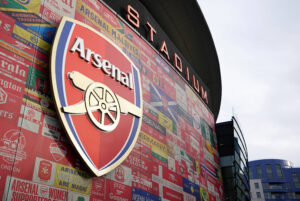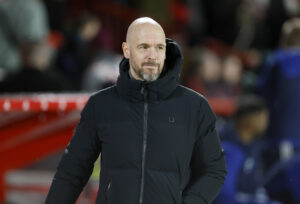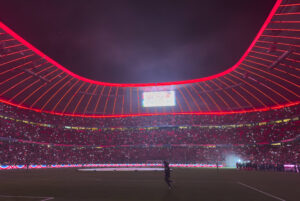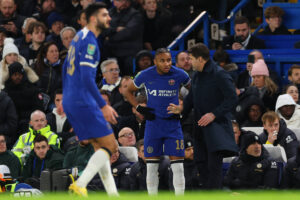As delectable as he was detestable, as decadent as he was destructive, Paolo Di Canio arrived in the Premier League as a talented, if travelled, 29-year-old in August 1997.
Paolo Di Canio: A Premier League Legend
Di Canio’s Beginnings
Arms folded, eyes to the floor, the Italian cut a brooding exterior next to David Pleat at his Hillsborough unveiling after Sheffield Wednesday brought the tempestuous Roman south, after the latest in a string of Di Canio induced bust-ups. This time at Celtic.
Growing up in the working-class Quarticciolo area of the Italian capital, Di Canio mastered the art of the enigmatic at an early age.
The fat little kid they called ‘lard-ball’ drew the ire of many in his AS Roma-supporting district by developing a love affair with bitter city rival’s SS Lazio. Both would last; the love affair with Lazio, and his ability to draw ire.
It was at his beloved Biancocelesti that he began his career in 1985, developing through the team’s youth system before eventually making his Serie A debut as a 20-year-old in 1988. A late start perhaps, he quickly developed a cult status amongst the infamous Irriducibilli – Lazio’s hardcore ultra-fan element – when arriving late at the back post to smash home a winner in the Rome Derby in January 1989, a win that went a long way to help a struggling side stay up that year.
By the summer of 1990, he had alerted the attentions of the biggest club in his homeland. A move to Juventus could have, even should have, paved the way for a glittering trophy-laden career for Di Canio, given what all his then teammates would achieve in the late 1990s. But, struggling for air in a team that included the creative forces of Roberto Baggio, Fabrizio Ravanelli, Gianluca Vialli and Andreas Moller, to name but a few, had worn thin by the summer of 1993.
He left for Napoli for a season before returning north again to AC Milan.
A Damaged Relationship Brings Him to Britain
That insatiable hunger for involvement and adoration prickled and punctuated his time at Milan and, despite winning his first, and subsequently, his last Serie A title, his relationship with Fabio Capello broke down as he struggled for first-team recognition.
One can only wonder if Britain would have ever been blessed with his presence, had Serie A not been enjoying its golden age at the summit of world football during the 1990s. For Di Canio, it seemed a career that looked to have promised so much would be choked into mediocrity in his homeland amongst the galaxy of stars.
What he wanted was a clean break – at Celtic in the summer of 1996, he found everything his heart desired. For a time, of course.
Signed by Hoops legend Tommy Burns for only £1 million, Di Canio discovered not just a manager who idolised and nurtured his more than apparent talent, but a friend who could channel the forces of darkness simmering under the surface and deliver explosions of sheer brilliance.
It was a magical year in Scotland. Thirty-seven appearances yielded 15 goals, that adoration he’d longed desired from the terraces, and even a Scottish PFA Player of the Year award. But, Questo è Paolo! It was a matter of when and not if.
A dispute over what Di Canio claimed was an agreement between himself and Fergus McCann – the Celtic chairman of the time – over better pay after his scintillating first season, proved the catalyst for the dissolution of what looked a happy marriage.
But Glasgow and Scotland’s loss became Sheffield, and ultimately, the English game’s gain.
Smooth Start
Forging a potent partnership with compatriot Benito Carbone, the duo seemed to singlehandedly steer Wednesday clear of what looked to be certain relegation after a disastrous start to the 1997/98 campaign.
The summer of 1998 saw Di Canio introduced to his third manager in less than a year at Hillsborough when Danny Wilson took over the reins from Ron Atkinson – Atkinson leaving under a cloud of controversy after rectifying the early season mistakes of Pleat the previous year.
It didn’t upset his groove.
He started the season relatively brightly, notching goals in 3-0 victories over Tottenham Hotspur and Blackburn Rovers as well as the consolation in a 2-1 defeat away to Wimbledon the weekend before the Saturday that would define for many, not just his time in England, but Paolo Di Canio himself.
An Iconic Moment
Champions Arsenal were the visitors on September 26th – a game that Wednesday would eventually go on to win 1-0 thanks to a sumptuous dipping effort late on from Lee Briscoe. However, nobody remembers that goal or the fact the victory was negotiated by ten men. Football simply remembers how the home side came to be at a numerical disadvantage.
In the final minute of the first half, a melee developed after Patrick Viera and Peter Rudi became embroiled in a disagreement. Di Canio, never one to back away from an argument, pitted himself against Arsenal hardman Martin Keown, the diminutive tyke holding his own.
When the dust settled and referee Paul Alcock regained control, it was he who would be fingered as the incident’s central aggressor. In what would become an iconic Premier League moment, Alcock branded a red card to an irate Di Canio, who subsequently shoved the official to the floor before being ushered away by coaches and teammates to the tunnel.
Another Chance and a Famous Goal
The big red button had been pushed again. Denounced by Wilson and the Wednesday hierarchy, Di Canio was slapped with an 11-match ban by the Premier League, and another love affair came to an abrupt end. In January 1999, Harry Redknapp threw the 30-year-old another life ring, admitting he was “taking a chance” in bringing him to West Ham United for a cut-price of £1.5 million.
He would go on to score five goals in that half-season, including one in a final day win against Middlesbrough that secured a fifth-place finish for the Irons, their highest ever Premier League finish. An achievement he could be proud of.
His absolution came with the turn of the millennia.
He had already helped himself to 12 Premier League goals by the time Wimbledon arrived at Upton Park in late March of 2000, helping West Ham consolidate their top-half position from the previous season.
In the eighth minute, a Trevor Sinclair cross swept from the right-hand side onto an already airborne Di Canio’s right foot. With all the artistry befitting what was another Italian Renaissance of sorts, he masterfully guided the ball past a helpless Neil Sullivan in the Dons goal on the volley.
The strike would be voted goal of the decade in a December 2009 poll by Sky Sports viewers and is lauded as one of the greatest acts of mastery the Premier League has ever seen.
His mastery was never in doubt, but if it was redemption Paolo Di Canio sought, he found it the following season.
Redemption
Locked at 1-1 in a tremendous battle with Everton at Goodison Park, Di Canio’s West Ham had the ascendency late on as they searched for a come-from-behind winner. But when Everton stopper Paul Gerrard seriously hurt himself in an innocuous stumble thwarting a West Ham attack, Di Canio earned the applause of the Goodison crowd when catching another Sinclair centre with the goal at his mercy.
This act of remarkable sportsmanship earned the firebrand a FIFA Fair Play Award at the end of the season, a far cry from that final day in Sheffield blue and white.
Maybe it was a physical representation of the love that he had for West Ham. For in love he was, and moreover they loved him.
Just weeks after the Everton game, Di Canio rebuffed what would be his final opportunity to play at one of Europe’s elite, saying no to Sir Alex Ferguson when Manchester United expressed great interest in acquiring his services. Now 32, Di Canio reportedly told a deflated Ferguson that he couldn’t turn his back on West Ham after everything the East Londoners had done for him.
Leaving West Ham
Like all true love stories, it ended in heart-breaking poignancy with the Hammers’ relegation from the Premier League on the final day of the 2002/03 season. Needing two wins from their final two games to stay alive, they beat Chelsea at Upton Park in the penultimate game of the season, Di Canio sprung from the bench to grab a winner twenty minutes from time.
The post-game scenes of raw emotion saw a tearful Di Canio parade to every corner of the ground, saluting the fans in what turned out to be his last home game in claret and blue.
Launched again from the bench with eight minutes remaining and 2-1 down away to Birmingham City the next week, of course, it would be Di Canio who would give his fanatical support the faintest glimmers of hope, drawing West Ham level in the 89th minute. Alas, they succumbed and an era had finished.
Career Endings
Di Canio enjoyed one more season in the Premier League before a return to his homeland – helping Charlton Athletic to a seventh-place finish in 2003/04.
He played right up until the threshold of his forties, entertaining his own people at first Lazio and then Serie C side Cisco Roma before hanging up his boots.
He scored 123 goals in 575 appearances with ten different clubs, never once appearing for the Italian national side.
That being said, his impact on the Premier League was unquestionable, his story paralleling with the likes of Cantona and Gascoigne, the flawed geniuses of the Premier League era.
We did get one more fleeting glance, this time of Paolo the manager, taking the reins at Sunderland mid-way through the 2012/13 season for what ultimately turned out to be an ill-fated stint at the helm. Despite securing survival for the Black Cats, finishing 17th, his time in the North East came to an end early on in the subsequent campaign after his side failed to win their opening five games.
His managerial shortcomings will do little to dampen the legendary status bestowed on him for what he could do on a Premier League pitch.
Delectable. Detestable. Decadent. Destructive.
Paolo Di Canio. A true Premier League great.
Main Photo






